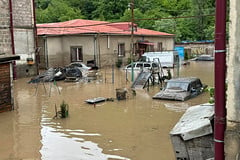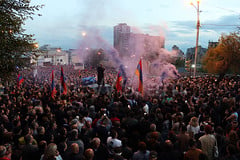Nagorno-Karabakh is perceived as part of Azerbaijan, but Azerbaijan's sovereign right to the residents of Nagorno-Karabakh can be exercised only within the framework of international law. PD Dr. Bjorn Schiffbauer, professor of public law, European and international law at the University of Rostock, Germany, noted this during the discussion of the humanitarian situation in Nagorno-Karabakh under the urgent procedure at Thursday’s session of the Parliamentary Assembly of the Council of Europe (PACE).
In the case of the residents of Nagorno-Karabakh, there is no legal justification that would allow Azerbaijan to ignore its obligations under international law. According to the law of international treaties, states must obey the decisions of international courts whose jurisdiction they have accepted. In the case of Nagorno-Karabakh, two international courts have jurisdiction and the right to make binding decisions for Azerbaijan. They are the European Court of Human Rights, and the International Court of Justice. Both have applied an intermediate measure to Azerbaijan, obliging Azerbaijan to ensure safe movement in both directions through the Lachin corridor by all means under its jurisdiction. At the same time, most of the Armenian population of Nagorno-Karabakh left the territory and entered Armenia through the Lachin corridor. However, according to the available information, Azerbaijan did not and does not provide passage of either people or perhaps supplies from Armenia to Nagorno-Karabakh. Thus, Azerbaijan did not fulfill the requirement to ensure uninterrupted movement in at least two directions, Schiffbauer said.
He emphasized that these two decisions refer to the rights of the ethnic Armenian population of Nagorno-Karabakh, which are guaranteed by the principles of equality and self-determination of peoples' rights of international law. In addition, according to him, the framework convention of the Council of Europe on the rights of national minorities, to which Azerbaijan has also joined, defines specific rights in this context.
The right to self-determination provides certain rights of autonomy of an independent organization within the framework of the legislation of the country having jurisdiction; in this case: Azerbaijan. Nevertheless, self-determination defined by international law does not imply termination of sovereignty by the use of force, Schiffbauer said.
Furthermore, the individuals of the ethnic Armenian population of Nagorno-Karabakh are protected by international human rights and humanitarian laws. The most adequate legal framework regarding the ethnic Armenian population is the European Convention on Human Rights: Article 2—on the right to life, Article 3—on the prohibition of torture, inhuman or degrading treatment, Article 6—on the right to a fair trial, Article 8—respect for the right to private and family life, which is one of the most important in terms of the situation in the Lachin corridor, Schiffbauer added.
The blockade of the Lachin corridor by Azerbaijan endangered the lives of many people and was an inhumane treatment, thus Azerbaijan violated Articles 2, 3, 6 and 8 of the European Convention. In addition to human rights, some provisions of International Criminal Law are also applicable here. At the moment, at least, it cannot be ruled out that certain war crimes and crimes against humanity have been committed by some individuals in Azerbaijan, Schiffbauer stated.
Reflecting on the crime of Genocide, Schiffbauer expressed the opinion that the situation in the Lachine corridor corresponds only to Article 2, Section C of the Genocide Convention; that is, to deliberately impose such conditions of life on a group of people that shall lead to the partial or complete physical destruction of that group. However, the fact that the Lachin corridor was reopened for the Armenians in one direction and they were able to escape to Armenia that way, according to the expert, contradicts the intention of physical destruction of the group.
The group of ethnic Armenians in Nagorno-Karabakh did not undergo physical extermination, but underwent social extermination through forced displacement. Nevertheless, the Convention on the Prevention of Genocide does not refer to ethnic cleansing. Therefore, it is unlikely that Azerbaijan wanted to destroy the Armenian population of Nagorno-Karabakh, as they were simply displaced, said Bjorn Schiffbauer.






















